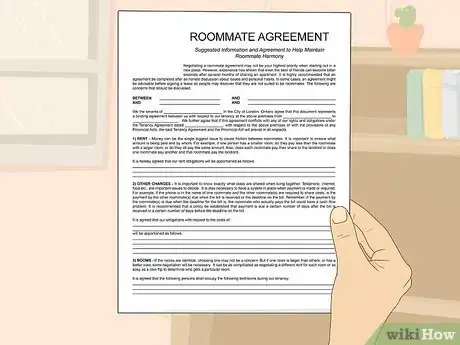This article was co-authored by Desiree Panlilio and by wikiHow staff writer, Sophia Latorre. Desiree Panlilio is a Teen Life Coach and the Owner of Encouraging Teens, LLC. With over three years of experience, she specializes in helping teens and young adults define roles, set goals, develop healthy academic and personal habits, grow in leadership potential, and create their life paths. Desiree holds a BSN in Nursing from The University of Victoria and an MA in Human Services Counseling with a concentration in Life Coaching from Liberty University.
There are 7 references cited in this article, which can be found at the bottom of the page.
wikiHow marks an article as reader-approved once it receives enough positive feedback. In this case, 88% of readers who voted found the article helpful, earning it our reader-approved status.
This article has been viewed 477,925 times.
Living with other people can be difficult, especially when each person comes from a different background and has their own ideas about how they want to live. Though having a roommate can be challenging at times, it can also be enjoyable and fun. Taking a few simple steps, including setting expectations early and sticking to them, will help you share your living space harmoniously.
Steps
Setting Expectations
-
1Discuss your expectations ahead of time.[1] Get together before or on the first day you move in together and talk about what each of you needs and wants from the other. This is your best chance to set boundaries with your roommate.[2] This applies to finances, food, clothes, possessions, use of common areas, loud activities or parties, quiet hours, cleaning responsibilities, and so on.[3]
- For example, say something like, “I don’t mind if you have people over, but can you try to keep the noise level down after 10 p.m.? I work the early shift so I have to be out the door at the crack of dawn.”
-
2Create a roommate agreement. Some people find it helpful to write up a "roommate agreement" in which you set down rules that everyone can agree to. This is a good way to make sure that everyone is clear on the rules and responsibilities. Once you’ve discussed your expectations, write up an agreement, then have each roommate sign and keep a copy of it.[4]Advertisement
-
3Make a financial agreement. It’s a good idea to get a financial agreement in writing to avoid any issues down the road. Decide how you’ll divide up the rent and utility payments, and determine whether or not you’ll split the cable and internet bill. Make sure you’re okay with paying half the bills if your roommate constantly leaves the sprinklers on, racks up pay-per-view charges, or likes to have all the lights in the house on at all times, all of which can add extra costs to the total.[5]
-
4Divide up responsibilities. Make a plan to divide up responsibilities and chores between you and your roommate.[6] For example, if your roommate is a good cook and you are not, ask them to cook if you’ll clean up afterward. It may also be a good idea to set up a chores schedule, where you will take turns cleaning the bathroom, taking out the trash, dusting, vacuuming, and so on.[7]
- You could ask, “How do you feel about creating a chore schedule? For example, I could do dishes this week, and you could do them next week. Does that sound fair?”
-
5Decide what you will share. Make a clear delineation between your stuff and your roommate’s stuff. Decide what contents in the fridge are okay to share and which are off limits, and discuss whether or not you’ll share laundry soap and other things of that nature. Remember to ask before "borrowing" anything, no matter if it's trivial, and always take good care of any borrowed items.[8]
-
6Agree to respect each other’s privacy and personal space. This is especially important if you share a small living area. Discuss each of your preferences regarding personal space and privacy. For instance, you may not mind if your roommate comes into your room unannounced, but they might find you to be very rude for doing so. Talk about these kinds of things so that you know what to expect from each other.[9]
- Alternatively, your roommate may like to share their experiences and feelings with you, but you may not feel comfortable doing the same. Be upfront about your preferences.
-
7Be prepared to compromise. Not everyone has the same ideas about day to day living as you do. Recognize that you are sharing a space with someone that may have different values and preferences. Take their feelings into consideration, and ask that they do the same for you.[10]
- For instance, if you’re dying to throw a party on Thursday night but your roommate has a final early the next morning, agree to postpone the bash till Friday evening, instead.
Living in Harmony
-
1Communicate effectively. As in any relationship, living with someone requires a great deal of work. Communication is key in making the relationship work well long-term, or even for a short time. If a problem comes up, it's better to talk about it right away than to try to ignore it and let it get worse.[11] For example, say “Chris, it upsets me when I wake up to find all the milk gone. If you use the last of something, can you please add it to the list?”[12]
- If you simply cannot communicate openly and there is tension all the time, you may be better off finding a new roommate.
-
2Follow through with your obligations. If you say you're going to clean the kitchen, pay your roommate back for your share of the lease or utilities, or call the landlord about a repair, then you need to do so. Nothing is more frustrating than agreeing to something with someone then finding out they didn’t hold up their end of the bargain. Be responsible for yourself and follow through with what you say you will do.
-
3Clean up after yourself. Though you may have agreed that your roommate would take out the trash on Fridays, that doesn’t mean you can pile stuff around the can until Friday rolls around. If you have a spare minute, just take out the trash. Don't leave your dirty dishes in the sink for days on end, dump your things in the living room, or leave mountains of laundry on top of the washer. Try to agree on a minimum standard of cleanliness that you'll all abide by.
-
4Spend time with your roommate. Say hello and goodbye, ask them how their day was, and show interest in their life. Getting to know the person you live with helps you understand their perspective, and allows them to understand yours. It also makes it easier to deal with problems that you have with that person if you’ve already established a rapport with them.[13]
- Try to set a time in which you both can hang out at least once a week. Make dinner together, watch a movie, or go for a hike.
- Do something nice for your roommate every so often—do their dishes, bake them cookies, or offer to give them a ride somewhere if they don't have a car.
-
5Accommodate your roommate. Understand what’s going on in your roommate’s life, and aim to be flexible and accommodating. If your roommate has a big test coming up, you should probably be quiet and let them study. If your roommate is busy and stressed with their job, give them some time and space to relax and unwind. After all, wouldn't you like your roommate to show you the same consideration?[14]
Choosing a Compatible Roommate
-
1Learn their habits. It can be tempting to select a roommate on the basis of how friendly they are, but you're better off judging them on the basis of day-to-day living compatibility. Find out if how often they’ll be home, what their work or school schedule is like, and whether they’re an early riser or a night owl. You should also consider how neat or messy the person is, as a sloppy roommate is sure to drive a neat-freak nuts.[15]
-
2Compare your preferences. It can be difficult to live with someone who enjoys absolute silence when you love to blast music at all hours of the day and night. Find out the person’s preferences before deciding to move in together. Ask what kind of noise level they prefer, what temperature they’re comfortable at, what kinds of foods they enjoy, if they’re sensitive to odors, and if they have any allergies. Be sure to find out if they smoke, drink, or use recreational drugs, too.
-
3Account for personality differences. Some people may have vastly different religious or political views that could cause conflict when living together. For example, someone who is very religious and conservative may not be okay with you bringing home one-night-stands. Some people may love to chat and discuss their feelings, while others prefer to keep things to themselves. The best roommate pairs will have similar views on these topics.[16]
-
4Check their rental history and financial situation. Ask for rental references and discuss the financial commitment you’re both making. Make sure they are prepared and able to stick to the lease agreement as well as any utility bills. You don’t want to get stuck paying the full amount of rent because they don’t have enough money to cover their portion![17]
House Rules Poster
Expert Q&A
-
QuestionWhat are the qualities of a good roommate?
 Desiree PanlilioDesiree Panlilio is a Teen Life Coach and the Owner of Encouraging Teens, LLC. With over three years of experience, she specializes in helping teens and young adults define roles, set goals, develop healthy academic and personal habits, grow in leadership potential, and create their life paths. Desiree holds a BSN in Nursing from The University of Victoria and an MA in Human Services Counseling with a concentration in Life Coaching from Liberty University.
Desiree PanlilioDesiree Panlilio is a Teen Life Coach and the Owner of Encouraging Teens, LLC. With over three years of experience, she specializes in helping teens and young adults define roles, set goals, develop healthy academic and personal habits, grow in leadership potential, and create their life paths. Desiree holds a BSN in Nursing from The University of Victoria and an MA in Human Services Counseling with a concentration in Life Coaching from Liberty University.
Teen Life Coach A good roommate respects the other person's boundaries and triggers. They also make an effort to communicate when any issues come up.
A good roommate respects the other person's boundaries and triggers. They also make an effort to communicate when any issues come up. -
QuestionWhat is proper roommate etiquette?
 Desiree PanlilioDesiree Panlilio is a Teen Life Coach and the Owner of Encouraging Teens, LLC. With over three years of experience, she specializes in helping teens and young adults define roles, set goals, develop healthy academic and personal habits, grow in leadership potential, and create their life paths. Desiree holds a BSN in Nursing from The University of Victoria and an MA in Human Services Counseling with a concentration in Life Coaching from Liberty University.
Desiree PanlilioDesiree Panlilio is a Teen Life Coach and the Owner of Encouraging Teens, LLC. With over three years of experience, she specializes in helping teens and young adults define roles, set goals, develop healthy academic and personal habits, grow in leadership potential, and create their life paths. Desiree holds a BSN in Nursing from The University of Victoria and an MA in Human Services Counseling with a concentration in Life Coaching from Liberty University.
Teen Life Coach Proper roommate etiquette involves setting clear boundaries and rules. Let the other person know what kind of things bother you, and be honest and open when any problems arise.
Proper roommate etiquette involves setting clear boundaries and rules. Let the other person know what kind of things bother you, and be honest and open when any problems arise. -
QuestionWhen is the right time to talk with my roommate?
 Community AnswerThat really depends on what you want to talk about. As a general rule, striking up a conversation works best when your roommate isn't about to rush off somewhere or engrossed in schoolwork. Choose a time when she looks relaxed and available.
Community AnswerThat really depends on what you want to talk about. As a general rule, striking up a conversation works best when your roommate isn't about to rush off somewhere or engrossed in schoolwork. Choose a time when she looks relaxed and available.
Warnings
- Although you should be flexible and accommodating, don’t let your roommate take advantage of you. Speak up for yourself when necessary.⧼thumbs_response⧽
- Remember, not everyone is meant to live together, regardless of how good a friendship you might have.⧼thumbs_response⧽
References
- ↑ Desiree Panlilio. Teen Life Coach. Expert Interview. 12 October 2021.
- ↑ Desiree Panlilio. Teen Life Coach. Expert Interview. 12 October 2021.
- ↑ https://mhanational.org/how-deal-roommate-problems
- ↑ https://mhanational.org/how-deal-roommate-problems
- ↑ https://uwm.edu/neighborhoodhousing/roommate-agreements/
- ↑ Desiree Panlilio. Teen Life Coach. Expert Interview. 12 October 2021.
- ↑ https://www.uwyo.edu/admissions/blog/2020/05/roommate-tips.html
- ↑ https://www.hdesd.org/how-to-be-a-good-roommate/
- ↑ Desiree Panlilio. Teen Life Coach. Expert Interview. 12 October 2021.
- ↑ https://mhanational.org/how-deal-roommate-problems
- ↑ Desiree Panlilio. Teen Life Coach. Expert Interview. 12 October 2021.
- ↑ http://www.educationcorner.com/living-with-a-roommate.html
- ↑ https://www.nbcnews.com/better/lifestyle/10-things-financial-experts-want-you-know-about-getting-roommate-ncna1063816
- ↑ https://www.uwyo.edu/admissions/blog/2020/05/roommate-tips.html
- ↑ https://uwm.edu/neighborhoodhousing/roommate-agreements/
- ↑ http://www.educationcorner.com/living-with-a-roommate.html
- ↑ https://www.nbcnews.com/better/lifestyle/10-things-financial-experts-want-you-know-about-getting-roommate-ncna1063816













































































